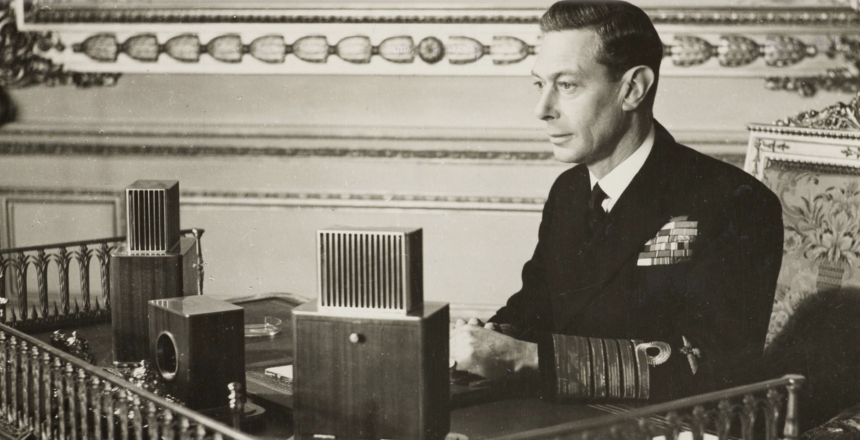If you’ve seen the 2010 film The King’s Speech, you know it is about King George VI’s 1939 live radio address explaining why the United Kingdom had to enter into war against Germany. Simple? Right? It was anything but for the new King. He faced several difficulties, including his impostor-syndrome anxiety after ascending to the throne, his publicized humiliating speech impediment (stammer), and public cynicism regarding his capacity to rule.
Per contra, King George VI addressed the nation on September 3, 1939, explaining why they were again at war. He addressed the nation clearly, minimizing his speech defect in making his case. The King proceeded slowly, steadily, and somberly, addressing his challenges, purposes, reassurances, and motivations. He embraced the theme of appealing to a sense of duty, reminding the nation they had tried diplomatic actions but had failed.
“Over and over again, we have tried to find a peaceful way out of the differences between ourselves and those who are now our enemies. But it has been in vain. We have been forced into a conflict.”
By using inclusive and collective words, “we,” “our,” and “ourselves,” he highlights the importance that it’s not just about the individual but how the nation can right a wrong.
First, he establishes trust by dispelling concerns about his leadership ability by demonstrating compassion as a leader. The King underscores in his second point that the enemy has perpetrated crimes against humanity, which calls for accountability. He argues that Germany’s massive ascent to power and contempt for the Treaty of Versailles—the treaty that ended the First World War—is unacceptable.
“It is the principle which permits a state, in the selfish pursuit of power, to disregard its treaties and its solemn pledges; which sanctions the use of force, or threat of force, against the sovereignty and independence of other states,” he says to express his point. Here, he identifies his audience and relationship with his compatriots, building a sense of trust and mutual duty.
- He calls for citizens to act with their personal, physical, and emotional strength, showing his faith in the abilities of the British.
- He calls them to remember the last World War and how they fought bravely by stating, “For the second time in the lives of most of us, we are at war.”
- He reminds them he also fought in the First World War.
At the close of his speech, the King declares a call to action. “But we can only do the right as we see the right and reverently commit our cause to God. If one and all we keep resolutely faithful to it, ready for whatever service or sacrifice it may demand, then, with God’s help, we shall prevail.” This 407-word speech inspired a country to action. What can we learn from the King’s speech that we can apply today?
Show up every day
The King practiced every day. Biographers agree he hated it and wanted to quit. He had to deliver his wartime speech. Practice. Practice. Practice. Prepare.
Be authentic and know your voice
The King knew his weaknesses. Who you are is who you are. Don’t be who you are not. Avoid mimicking other speakers. Develop a style that is fitting for you. King George VI knew his stuttering problem was a cause of public embarrassment. Does he change to suit? The King understood that being authentic meant connecting with his people. So, he led with his vulnerability—his voice. Pushing past the desire to be loved and approved has expansive power.
Speak your heart unafraid of your truth
The late professional speaker Og Mandino wrote the bestselling book The Greatest Salesman in the World and 16 other motivational books. His books have sold a record 50 million copies. In the 1980s, he became one of the most sought-after motivational speakers worldwide. Mandino’s message? Every person on earth is a miracle and should choose to direct their life in confidence and congruence to the laws that govern abundance.
Mandino believed in speaking from your heart, from where you came from—you may not appreciate where you came from or not. But he didn’t practise what he preached. He felt ashamed to mention his down-and-out days. After one of his speeches, according to his biographers, a woman who sold Amway approached him and said, “You made success sound so easy. That’s because you’ve never had to suffer much failure and sorrow. You don’t understand what it’s like to struggle from the bottom of the pile.”
Mandino wrote that after her comment, “I didn’t sleep a wink that night. Only a few close friends knew that I had crawled out of the gutter and discovered a better way to live only after years of horror, pain, and tears. Once more, God had moved a chess piece in my life. That soft-spoken Amway lady had delivered the message.”
Within a week, Mandino had rewritten his speech. “From then on, I spoke without hesitation of my not-so-glory days,” he said in a 1980 interview. “I wanted the listener or reader to think, ‘If he can turn his life around, with the little he had to work with, then, by God, so can I.’”
So can you, fellow Toastmasters
King George VI’s speech made his words the heart of his nation. Without the people, the future was looking dim. His speech impediment and criticisms became secondary. Bouna Aly refused to accept MS and her speech impediment as a limitation and went on to have heart-to-heart connections. She brings hope to those with MS. Og Mandino spoke from his heart while elevating his audiences and connecting to their core.
That’s because these three speakers understood the meaning of it’s about your audience. Whether you want to speak more clearly at work, in social gatherings, at your Toastmasters club, or wish to speak professionally, this book will help.
Through your heart—the one beating inside you—I will show that you, as a speaker, will touch many hearts. You will understand how to endear yourself to your audiences and leave them with an impression of increase to improve their lives.







